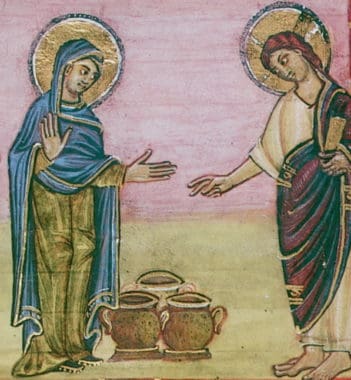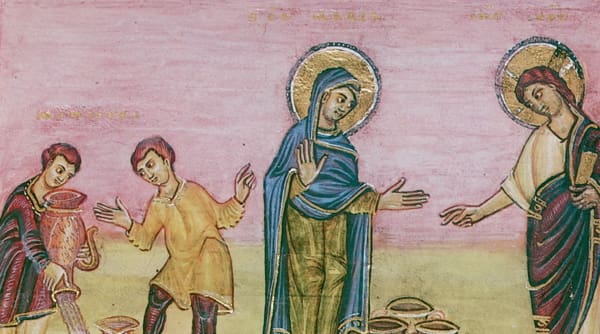Should I Focus on Jesus and Disengage from the World?
Dear Father John, Because I am called to the Christian life, shouldn’t I focus my life around Jesus and disengage myself with the world?
There Is Work to Do
 IN THE EARLY Church, some fresh Christian converts had the wrong idea of how Christ’s followers were supposed to behave in this world. They focused so much on Jesus’s promise to come again and bring human history to its fulfillment that they unplugged themselves from normal life. They idly awaited the Lord’s Second Coming, refraining from any productive activity besides prayer. This caused problems, as can be imagined, for the Christian communities. St. Paul actually had to address it explicitly in one of his letters, correcting those Christians in Thessalonica who were remiss in even the most basic responsibility to make a living:
IN THE EARLY Church, some fresh Christian converts had the wrong idea of how Christ’s followers were supposed to behave in this world. They focused so much on Jesus’s promise to come again and bring human history to its fulfillment that they unplugged themselves from normal life. They idly awaited the Lord’s Second Coming, refraining from any productive activity besides prayer. This caused problems, as can be imagined, for the Christian communities. St. Paul actually had to address it explicitly in one of his letters, correcting those Christians in Thessalonica who were remiss in even the most basic responsibility to make a living:
In fact, when we were with you, we instructed you that if anyone was unwilling to work, neither should that one eat. We hear that some are conducting themselves among you in a disorderly way, by not keeping busy but minding the business of others. Such people we instruct and urge in the Lord Jesus Christ to work quietly and to eat their own food. But you, brothers, do not be remiss in doing good. (2 Thessalonians 3:10–13)
Hearts in Heaven—Feet on the Ground
This problem has cropped up at various times in the history of the Church. Outsiders criticized members of the Church for being so focused on the life to come that they disengaged from life here on earth. Perhaps in certain cases the criticism was valid. Yet the actual doctrine of the Church has always stressed the importance of Christians staying engaged in earthly life in order to redeem human experience and shape it in accordance with God’s wise plan. Here is how the Second Vatican Council expressed the critics’ point of view in its modern context:
Not to be overlooked among the forms of modern atheism is that which anticipates the liberation of man especially through his economic and social emancipation. This form argues that by its nature religion thwarts this liberation by arousing man’s hope for a deceptive future life, thereby diverting him from the constructing of the earthly city. 1
And here is how that same Council asserted the proper understanding of the relationship between hope in heaven and active engagement here on earth:
This council exhorts Christians, as citizens of two cities, to strive to discharge their earthly duties conscientiously and in response to the gospel spirit. They are mistaken who, knowing that we have here no abiding city but seek one which is to come, think that they may therefore shirk their earthly responsibilities. For they are forgetting that by the faith itself they are more obliged than ever to measure up to these duties, each according to his proper vocation. 2
In other words, Christians should be hard workers. A follower of Christ knows that this earthly life is an opportunity to develop one’s potential and make a difference in the world. As Christian disciples, that opportunity is the arena we are given to exercise our love, to show and grow our commitment to God and neighbor by putting our lives and talents at the service of others.
![WeinstockAlgunderWaalweg2012-08-10[VineBranches]](https://spiritualdirection.com/wp-content/uploads/2014/09/WeinstockAlgunderWaalweg2012-08-10VineBranches-380x301.jpg) A Fruitful Partnership
A Fruitful Partnership
The landowner in the parable of the vineyard goes out to look for workers, and he gives them work: “You too go into my vineyard.” The vineyard image appears throughout the history of salvation as recorded in the Bible. As St. John Paul II pointed out: “The vineyard is the whole world (cf. Matthew 13:38), which is to be transformed according to the plan of God in view of the final coming of the Kingdom of God.”
The vineyard is a powerful image for the Christian adventure, even on a merely natural level. The Lord owns the vineyard, and the Lord gives the vines the power to produce grapes. He also provides the sunshine, air, and water the vine need to grow and bear fruit. But those God-given elements will only reach their full potential through cultivation by human beings. The vineyard needs intense labor from many workers in order to produce the fine wine it is capable of producing.
 It is no coincidence that Jesus first miracle consisted of turning water into wine. In a sense, the reproduction of that miracle throughout history is the primary work of the Church. Through the cultivation of the vineyard of the world, the Church infuses God’s grace into human affairs, transforming the basic elements of the earthly community into the fine wine of “a chosen race, a royal priesthood, a holy nation, a people of his own” (1 Peter 2:9).
It is no coincidence that Jesus first miracle consisted of turning water into wine. In a sense, the reproduction of that miracle throughout history is the primary work of the Church. Through the cultivation of the vineyard of the world, the Church infuses God’s grace into human affairs, transforming the basic elements of the earthly community into the fine wine of “a chosen race, a royal priesthood, a holy nation, a people of his own” (1 Peter 2:9).
Our Best Work
There truly is work to do—both normal earthly work that needs to be seasoned with Christian love and grace in order to reach its full potential, as well as the more directly supernatural work of spreading faith in Jesus Christ. This is the work Jesus calls us all to engage in by sending us into his vineyard. This is the work his Church was established to accomplish.
And it is this work that will give the deepest meaning to our lives. As Pope Francis explained it:
When the Church summons Christians to take up the task of evangelization, she is simply pointing to the source of authentic personal fulfillment. For here we discover a profound law of reality: that life is attained and matures in the measure that it is offered up in order to give life to others. This is certainly what mission means. 3
And so the Church wisely and lovingly invites each one of us, today and every day, to take our unique place in the vineyard of the Lord:
The mission of salvation is universal; for every person and for the whole person. It is a task which involves the entire People of God, all the faithful. Mission must, therefore, be the passion of every Christian; a passion for the salvation of the world and ardent commitment to work for the coming of the Father’s kingdom. 4
1 Second Vatican Council, Gaudium et Spes, 21.
2 Ibid., 43.
3 Pope Francis, Evangelii Gaudium, 10.
4 St. John Paul II, Message for World Mission Sunday, 9; October 24, 1999.
+
Editor’s Note: This is an excerpt from Father John Bartunek’s book “Go! 30 Meditations on How Best to Love Your Neighbor as Yourself” filled with “practical examples and down-to-earth wisdom which will show you how to bring Christ into each facet of your life”. Click here to learn more about the book…or if you wish to get it for a friend or relative who doesn’t read on line.
Art: Modified Details of A page from the Bamberg Apocalypse – The Ascension, author unknown, PD-US author’s life plus 70 years or less; Vine branch on the way “Algunder Waalweg”, Huberbe, 10 August 2012, CC; The Narrow Gate, 2005-12-12, http://www.geograph.org.uk/photo/90997 geograph.org.uk, author: http://www.geograph.org.uk/profile/3495 David Long, CC; Detail from Codex Egberti fol. 20v. Weinwunder auf der Hochzeit zu Kana (Codex Egberti [created for Egbert, Archbishop of Trier, 977-993] fol.20v. Wine miracle at the wedding at Cana. ), anonymous 10th-century monk, 10th century, PD-US copyright expired; all Wikimedia Commons.


